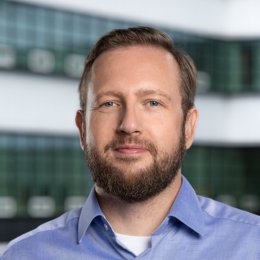Chemical Science and Engineering applicants Hubert Gojzewski and David Fernandez Rivas have both received good news. Their proposals for Virtual International Collaboration Projects (VIS) have been approved.
Fair use of AI
Hubert's proposal is about the fair use of artificial intelligence (AI) in assignments for international students in the natural sciences. The use of AI can support students in their learning process, but unregulated use can lead to accusations of fraud. The project will involve 12 Dutch and 12 Polish students to work out rules for the use of AI and the limits of its use, with the aim of stimulating discussion about the integrity of scientists and the acknowledgment of scientific sources. The University of Twente, and the Poznan University of Technology, Poland have AI experts who want to contribute to this project.
Commercial innovation in the medical sector
David has proposed a learning program called "Glide Path to Commercialization for a Medical Device for 21st Century Therapeutics," in which students collaborate to learn how to bring innovations to the market. The program focuses on both high- and low-income countries and involves key stakeholders in research innovations. The experiences of the first student cohort will be documented and published as a case study and serve as the basis for future exchange programs. The University of Twente wants to learn from the University of the Witwatersrand in South Africa, and other Dutch universities (such as 4TU) can eventually benefit from this.
VIS
Virtual International Collaboration Projects (VIS) are projects in which students and academics from different countries collaborate on joint research projects. The projects are funded by the Dutch Ministry of Education, Culture, and Science. The aim of these projects is to promote intercultural exchange and collaboration, as well as the sharing of knowledge and expertise. The use of digital technologies, such as video conferencing and online collaboration platforms, makes it possible to conduct these projects remotely, without the need for physical travel. VIS projects are an important way to connect globally and enrich the knowledge and skills of students and academics.
New opportunities for CSE students at S&T
Last year, Arturo Susarrey Arce, assistant professor in Chemical Science & Engineering, at Nanotechnology, and in the ICR&TIST minor, together with Herbert Wormeester (programme director of Nanotechnology), won this VIS prize. This allowed them to set up a 5-EC course on sustainable nanotechnology within the master’s programme in Nanotechnology, together with Tech de Monterrey in Mexico in the COIL (Collaborative Online International Learning) project. This education started in February; it is CBL (challenge-based learning), where students have to solve problems together and learn to work with fellow students from different cultural backgrounds and in different time zone. With the two new winners Hubert and David, there are new opportunities to offer CSE students an interesting learning experience in an exciting project with students from Poland or South Africa, without the need to travel.
Interested in VIS funding or applying next year? Contact Linlin Pei for more information: l.pei@utwente.nl.







